Surely some things are actually coincidence, but so often chance happenings carry the fingerprints of what may be more accurately referred to as a "God incident."
The plan for the Youth group meeting yesterday afternoon was to have a "Destination Unknown" trip working on the Parable of the Good Samaritan. Destination Unknown trips are an idea we got from a book of the same name. You announce that you are going to an unknown place for the meeting, gather, climb into the van and go to one or more places for activities connected to the lesson for the day. We have visited a funeral home, Wal-Mart, downtown St. Marys and other destinations over time, all with a message tied to some activities at the unknown destination.
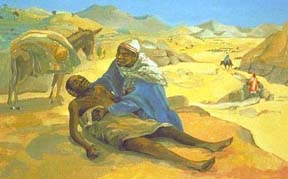
For the Good Samaritan, we planned to go to houses of some teens in the van and ask, "Who lives here?" Then point to the surrounding houses, asking who lives in those as well. Move on to another house, and so on for three or four houses. Then start going to houses of people who attend King of Peace, but whose house might not be known to anyone in the van. Once I said whose house it was, we still would not know who lived in the houses nearby. Then we would stop for snacks and read and discuss the parable, before moving to phase two (mentioned below).
That was the plan and we stuck to it. But along the way, we changed the route in order to meet up with two teens arriving late. We were on a road we hadn't planned to drive down when we saw a truck with a badly flat tire and the female driver on the phone. I asked if the youth wanted to stop and help and they said they did. The woman affirmed that she very much wanted assistance. She went on to explain that her husband, who she was talking with by cell phone, was on duty at the Naval base and could not come to help her and her kids for quite some time. We got out and started to go over to change the tire and referring to the lettering on the church van she told her husband over the phone "The Episcopal Churches of Camden County are going to change the tire." We changed the flat and got her and the kids on the road to Wal-Mart to have the tire plugged. We continued on our rounds having been given the chance to serve as "Good Samaritans" while learning about the parable.
By the way, part II had us travel to the ruins of a house that burned to the ground a couple of years ago. I told the group that while the houses we visited looked great on the outside, the emotional and spiritual lives of some of the people who lived in those houses was more akin to the burned out ruins. Many of our neighbors are hurting and in need.
In the parable of the "Good Samaritan" we learn that while we start with ourselves and ask, "Who is my neighbor?" God starts with the person in need and asks, "
Who do I have in the area that can help?" Often we can be the answer to God's question if we are open to the persons who are hurting and in need that God puts along our path. It would have been easy to assume that the woman was on the cell phone and so help was on the way, which was my first thought. But on consideration, it made more sense to stop and confirm that. In fact, she did need help and we were the ones God had in the area (for our sakes more than hers).
peace,
Frank+
The Rev. Frank Logue, Pastor +
King of Peace Episcopal Church

 In the recent book The Unchurched Next Door, Thom Rainer, Dean of the Billy Graham School of Evangelism, shares the fruit of an extensive research project into Americans who do not currently attend a church. Two of the surprises of the research are 1) Many people who do not currently have a church home feel guilty about not attending church and wish they could find a place they are comfortable worshipping. and 2) 82 percent of the people surveyed are at least "somewhat likely" to attend church when they are invited.
In the recent book The Unchurched Next Door, Thom Rainer, Dean of the Billy Graham School of Evangelism, shares the fruit of an extensive research project into Americans who do not currently attend a church. Two of the surprises of the research are 1) Many people who do not currently have a church home feel guilty about not attending church and wish they could find a place they are comfortable worshipping. and 2) 82 percent of the people surveyed are at least "somewhat likely" to attend church when they are invited. 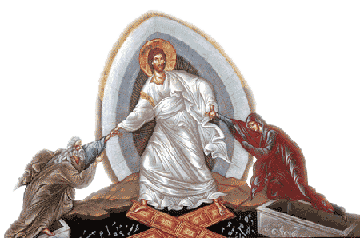

 In
In 




 The scriptural witness summons all believers in every generation to call Mary 'blessed'; this Jewish woman of humble status, this daughter of Israel living in hope of justice for the poor, whom God has graced and chosen to become the virgin mother of his Son through the overshadowing of the Holy Spirit. We are to bless her as the 'handmaid of the Lord' who gave her unqualified assent to the fulfilment of God's saving plan, as the mother who pondered all things in her heart, as the refugee seeking asylum in a foreign land, as the mother pierced by the innocent suffering of her own child, and as the woman to whom Jesus entrusted his friends.
The scriptural witness summons all believers in every generation to call Mary 'blessed'; this Jewish woman of humble status, this daughter of Israel living in hope of justice for the poor, whom God has graced and chosen to become the virgin mother of his Son through the overshadowing of the Holy Spirit. We are to bless her as the 'handmaid of the Lord' who gave her unqualified assent to the fulfilment of God's saving plan, as the mother who pondered all things in her heart, as the refugee seeking asylum in a foreign land, as the mother pierced by the innocent suffering of her own child, and as the woman to whom Jesus entrusted his friends.  Today, I am giving a presentation on Servant Leadership to the current Leadership Camden class. I'm sure I was asked to do this because I am a minister. After all, Jesus embodied servant leadership. He said, "I came not to be served, but to serve" and on his last night with his disciples, he gave them the example of leadership in washing their feet. But Jesus was not a slave to all. What he did was to meet someone's needs rather than to give the people he met everything they wanted. Great leaders always meet their employees needs. If you can't meet their needs to take care of their families, employees will find an employer that can. Likewise, we must give people the tools and the room to do their jobs well.
Today, I am giving a presentation on Servant Leadership to the current Leadership Camden class. I'm sure I was asked to do this because I am a minister. After all, Jesus embodied servant leadership. He said, "I came not to be served, but to serve" and on his last night with his disciples, he gave them the example of leadership in washing their feet. But Jesus was not a slave to all. What he did was to meet someone's needs rather than to give the people he met everything they wanted. Great leaders always meet their employees needs. If you can't meet their needs to take care of their families, employees will find an employer that can. Likewise, we must give people the tools and the room to do their jobs well.  “Let us weigh the gain and the loss in wagering that God is. Let us estimate these two chances. If you gain, you gain all; if you lose, you lose nothing. Wager, then, without hesitation that He is.”—Blaise Pascal (1623-1662)
“Let us weigh the gain and the loss in wagering that God is. Let us estimate these two chances. If you gain, you gain all; if you lose, you lose nothing. Wager, then, without hesitation that He is.”—Blaise Pascal (1623-1662) The word "Trinity" does not appear in the Bible, though the New Testament does contain some clear references to God: Father, Son and Holy Spirit (including two in
The word "Trinity" does not appear in the Bible, though the New Testament does contain some clear references to God: Father, Son and Holy Spirit (including two in 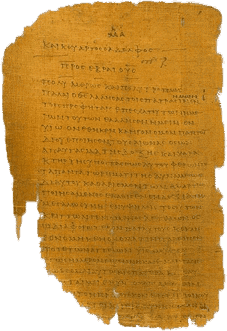 In
In  The red, white and blue shield pictured here is the symbol for the Episcopal Church USA. Adopted in 1940, the shield brings together some of the Episcopal Church USA's history, offering a brief history lesson through its design.
The red, white and blue shield pictured here is the symbol for the Episcopal Church USA. Adopted in 1940, the shield brings together some of the Episcopal Church USA's history, offering a brief history lesson through its design. In the picture here, a detail view from the Sistine Chapel, Adam's hand is the one on the left reaching out toward God. On the right, God's hand is straining toward Adam. Christianity teaches that it is God who bridges the gap between the creator and the created. Robert Taft has written that each time we worship God, this gap between God and Adam vanishes. God reaches us in the liturgy (the words and actions of our worship). Coming together for worship week after week shapes the way we see the world. This doesn't happen in a single act of worship as much as over the long haul of returning again and again to encounter God in worship. Theology (what we think of God) is a word exchanged between us and God, starting on God's side of the equation. Theology then is not only something learned, it is also something lived, not merely rationally agreed to, but also experienced in the very structure of our worship as well as its words and gestures.
In the picture here, a detail view from the Sistine Chapel, Adam's hand is the one on the left reaching out toward God. On the right, God's hand is straining toward Adam. Christianity teaches that it is God who bridges the gap between the creator and the created. Robert Taft has written that each time we worship God, this gap between God and Adam vanishes. God reaches us in the liturgy (the words and actions of our worship). Coming together for worship week after week shapes the way we see the world. This doesn't happen in a single act of worship as much as over the long haul of returning again and again to encounter God in worship. Theology (what we think of God) is a word exchanged between us and God, starting on God's side of the equation. Theology then is not only something learned, it is also something lived, not merely rationally agreed to, but also experienced in the very structure of our worship as well as its words and gestures.
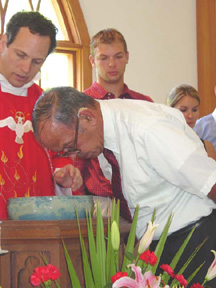
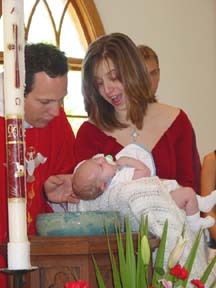
 To make sure that this blog doesn't take itself too seriously, here is the
To make sure that this blog doesn't take itself too seriously, here is the  When the Titanic sunk on April 14, 1912, more than eight out of ten of those who drowned were men. As the recent movie of the event recounted, many of these men had sacrificed themselves so women and children would have seats in the scarce lifeboats. Eighty years later, the Pittsburgh Post-Gazette queried its readers about whether they, under such circumstances, be willing to relinquish their seats. Only 35% of the men said they would for unrelated women and children. In fact, only 54% were willing to cede their lifeboat seats for their mothers and 67% for their spouses.
When the Titanic sunk on April 14, 1912, more than eight out of ten of those who drowned were men. As the recent movie of the event recounted, many of these men had sacrificed themselves so women and children would have seats in the scarce lifeboats. Eighty years later, the Pittsburgh Post-Gazette queried its readers about whether they, under such circumstances, be willing to relinquish their seats. Only 35% of the men said they would for unrelated women and children. In fact, only 54% were willing to cede their lifeboat seats for their mothers and 67% for their spouses.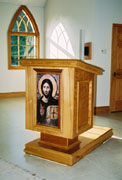
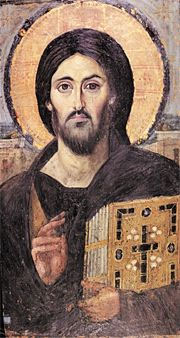 In keeping with Jewish theology which spoke of the right hand of God as love and the left hand as justice, this icon shows Christ making a sign of blessing with his right hand, while holding the Gospel book in his left. The eyes are also asymmetrical, which some connect to one eye looking on in judgment, seeing all, while the other looks on in love. Another possible reason for the icon's particular way of portraying Jesus comes from an interesting source. It has been noted that the icon also
In keeping with Jewish theology which spoke of the right hand of God as love and the left hand as justice, this icon shows Christ making a sign of blessing with his right hand, while holding the Gospel book in his left. The eyes are also asymmetrical, which some connect to one eye looking on in judgment, seeing all, while the other looks on in love. Another possible reason for the icon's particular way of portraying Jesus comes from an interesting source. It has been noted that the icon also 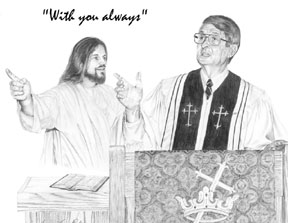
 In
In  King of Peace is an
King of Peace is an 
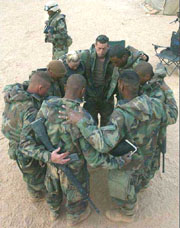
 Sound to good to be true? The electronic sword on offer is a computer version of the "sword of the spirit" which is how the letter to the Ephesians refers to the Word of God. King of Peace parishioner Matt Munro recommends
Sound to good to be true? The electronic sword on offer is a computer version of the "sword of the spirit" which is how the letter to the Ephesians refers to the Word of God. King of Peace parishioner Matt Munro recommends  One of the
One of the  So what was the point of today's sermon? It's not that we can't tell you. But, some things just work better in context. While we do provide most sermons online in both text and audio formats, some weeks you just have to be there to understand.
So what was the point of today's sermon? It's not that we can't tell you. But, some things just work better in context. While we do provide most sermons online in both text and audio formats, some weeks you just have to be there to understand.







1 Comments:
At 6/05/2005 8:28 AM, Anonymous said…
Anonymous said…
AMEN, Preach it brother
Post a Comment
<< Home